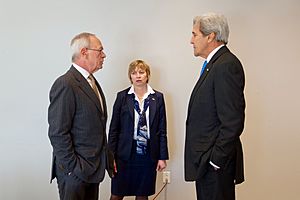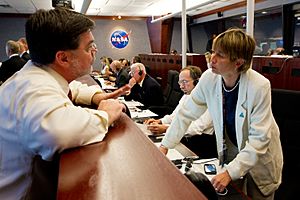Maria Zuber facts for kids
Quick facts for kids
Maria Zuber
|
|
|---|---|
 |
|
| Former Co-chair of the President's Council of Advisors on Science and Technology | |
| Preceded by | Position established |
| Personal details | |
| Born | June 27, 1958 Norristown, Pennsylvania, U.S. |
| Education | University of Pennsylvania (BS) Brown University (MS, PhD) |
| Awards | NASA Distinguished Public Service Medal |
| Scientific career | |
| Fields | Planetary science |
| Institutions | Massachusetts Institute of Technology |
| Thesis | Unstable Deformation in Layered Media: Application to Planetary Lithospheres (1986) |
| Doctoral advisor | E. M. Parmentier |
Maria T. Zuber (born June 27, 1958) is a top American scientist who studies planets. She is a professor of geophysics (the physics of the Earth and other planets) at the Massachusetts Institute of Technology (MIT). She has also advised U.S. presidents on science and technology.
Zuber has worked on more than six NASA missions. These missions have mapped the surfaces of the Moon, Mars, Mercury, and several asteroids. She was the main scientist for the Gravity Recovery and Interior Laboratory (GRAIL) mission. This mission studied the Moon's gravity to understand what's inside it.
She has also held important government roles. From 2021 to 2024, she was a co-chair of President Joe Biden's science advisory council. She also served on the National Science Board for both President Donald Trump and President Barack Obama.
Contents
Early Life and Schooling
Maria T. Zuber was born on June 27, 1958, in Norristown, Pennsylvania. She grew up in a small town called Summit Hill, Pennsylvania, which was known for its coal mining. She was one of five children. Her grandfathers were both coal miners.
Zuber loved learning and became the first person in her family to go to college. In 1980, she earned a degree in astronomy and geology from the University of Pennsylvania.
After college, she went to Brown University. There, she earned two more advanced degrees in geophysics. She once joked about not wanting to go to a "nerd school" like MIT. But today, she is a leading professor there and says, "I'm the biggest nerd there is."
A Career Exploring Planets
Before joining MIT, Zuber worked at Johns Hopkins University and for NASA. In 1995, she became a professor at MIT. She later became the first woman to lead a science department at the famous university.
Zuber's main work is studying the surfaces and insides of planets and other solid objects in our solar system. She is an expert at using special tools, like lasers and gravity sensors, to create detailed maps of planets.
Mapping Other Worlds
The maps Zuber helped create of Mars and the Moon are even more detailed than the maps we have of Earth. These maps help scientists understand a planet's history and what it's made of. She has been a key team member on ten NASA missions, including:
- Mars Global Surveyor: This mission mapped the entire surface of Mars.
- Dawn: This spacecraft visited the giant asteroids Vesta and Ceres.
- MESSENGER: This was the first spacecraft to orbit the planet Mercury.
Inspiring Young Scientists
Zuber has been fascinated by planets since she was a child. She wanted to share this excitement with students. For the GRAIL mission, she worked with former astronaut Sally Ride to create a program for schools.
This program, called MoonKAM, allowed middle school students to take their own pictures of the Moon using cameras on the GRAIL spacecraft. A contest was even held to name the two spacecraft. Students chose the names Ebb and Flow.
Honors and Awards

Maria Zuber has received many awards for her amazing work. Here are a few of them:
- NASA Distinguished Public Service Medal: This is one of NASA's highest honors for a non-government worker.
- Carl Sagan Memorial Award: An award for scientists who have done great work in exploring the cosmos.
- America's Best Leaders: In 2008, U.S. News & World Report magazine named her one of the country's best leaders.
- Gerard P. Kuiper Prize: A top prize in planetary science, which she won in 2019.
In her honor, an asteroid that orbits the sun between Mars and Jupiter was named 6635 Zuber.
Zuber is also a fellow, or a special member, of many important science groups, including the American Geophysical Union and the American Association for the Advancement of Science.
See also
- List of women in leadership positions on astronomical instrumentation projects
 | Janet Taylor Pickett |
 | Synthia Saint James |
 | Howardena Pindell |
 | Faith Ringgold |


